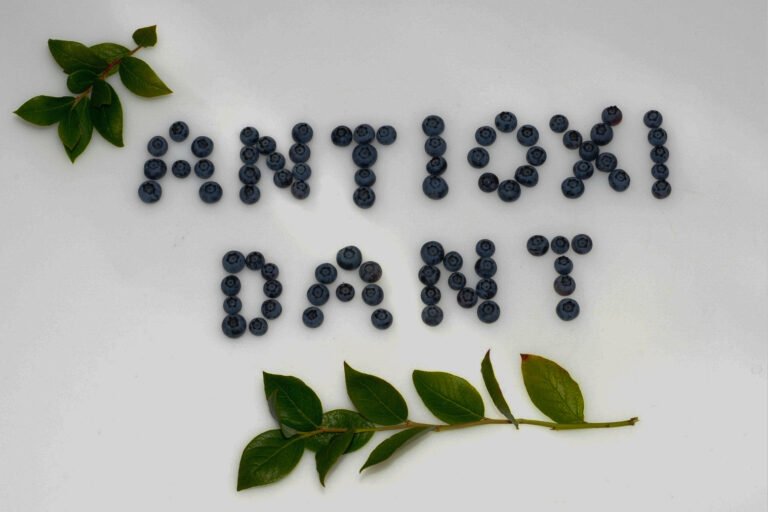Check out our social media feed. doesn’t it seem like everyone defines themselves by being “for” something or “against” something? Here at Sally B’s, we’re ready to take our stand: we’re unabashedly, confidently, very pro-antioxidants.
Antioxidant is one of those words we’ve all been hearing for years. You may know that antioxidants fight free radicals* but not much else. So let’s go back to high school chemistry and find out exactly what it all means.
*Note: Isn’t it a shame that “bad” has such a nice name and “good” sounds so negative? We’d rather be known as free radicals than anti-something. If anyone knows who makes the decisions about what we call these things, please send them our way.
What is a free radical?
Anyone remember protons, neutrons and electrons? A quick refresher: protons and neutrons are in the middle of an atom while electrons orbit the outside of the atom. When a cell undergoes a chemical reaction, an atom may lose an electron to a neighboring atom. These unbalanced atoms are called free radicals. To balance out, the free radical atom will “steal” an electron from a neighboring, healthy atom, setting off a chain reaction of atoms stealing from each other. This process is known as free radical damage or oxidation because oxygen atoms are usually the victims of this electron theft (it’s the same process that causes iron-based metals to rust). In our body, this process can eventually lead to cell damage or cell death.
Chemical reactions that can cause free radical reactions are quite common: they can happen when our bodies are exposed to external elements (think sunlight, cigarette smoke or air pollution). in times of stress; or when we metabolize glucose (see our recent blog on sugar here). When there is an abundance of free radicals, the body cannot naturally defend itself and damage to the skin occurs. This damage can include inflammation, wrinkles and blackheads. In worst-case scenarios, free radical damage can lead to skin cancer.
How do we “neutralize” free radicals?
Once free radicals are present in your body, the only way to prevent them from causing permanent damage is to present them with the missing electron and break the chain. Enter the antioxidants! Antioxidants are compounds that remain stable regardless of how many electrons they have. think of them as electron banks willing to share. This makes them an excellent free radical scavenger. By sharing their electrons, they can recreate an unstable set of free radicals without becoming unstable themselves. Unfortunately, antioxidants don’t have an infinite number of electrons, so you need to keep your body well supplied.

 Eating antioxidant-rich foods—such as blueberries, blackberries, dark green vegetables, nuts, green tea, and cranberries—is a great way to fuel your body with free radical scavengers. You can also apply antioxidants topically. Many skin care products incorporate antioxidants into their formulations to help repair and restore cellular damage. There are even some that provide preventive care like ours Antioxidant day serumwhich uses ingredients from nature to create a protective barrier on the cells under the skin.
Eating antioxidant-rich foods—such as blueberries, blackberries, dark green vegetables, nuts, green tea, and cranberries—is a great way to fuel your body with free radical scavengers. You can also apply antioxidants topically. Many skin care products incorporate antioxidants into their formulations to help repair and restore cellular damage. There are even some that provide preventive care like ours Antioxidant day serumwhich uses ingredients from nature to create a protective barrier on the cells under the skin.
 Vitamin C is an important and well-known antioxidant. In its most effective forms, such as L-ascorbic acid, vitamin C can protect skin cells from UV-related damage, strengthen skin, reduce inflammation, and promote collagen production. We use L-ascorbic acid in our Antioxidant Skin Boost, but we’ve also added a handful of other noteworthy ingredients like resveratrol and pomegranate extract. Resveratrol is an antimicrobial substance produced by plants to fight stress, infection and UV radiation. In humans, it does all of this while hunting down free radicals AND preventing them from forming. Studies show that its potency and effectiveness are even greater than vitamin C.
Vitamin C is an important and well-known antioxidant. In its most effective forms, such as L-ascorbic acid, vitamin C can protect skin cells from UV-related damage, strengthen skin, reduce inflammation, and promote collagen production. We use L-ascorbic acid in our Antioxidant Skin Boost, but we’ve also added a handful of other noteworthy ingredients like resveratrol and pomegranate extract. Resveratrol is an antimicrobial substance produced by plants to fight stress, infection and UV radiation. In humans, it does all of this while hunting down free radicals AND preventing them from forming. Studies show that its potency and effectiveness are even greater than vitamin C.
 One of our favorite antioxidant ingredients is Coenzyme Q10 (also known as CoQ10). Your body naturally produces CoQ10 to help cells grow and provide protection against cancer. As we age our levels of CoQ10 drop significantly. This is believed to be one of the contributing factors to the signs of aging. Because of this, we add a lab-created non-toxic CoQ10 Antioxidant night serum. And a fun fact, it’s CoQ10 (as well as Sea Buckthorn Oil, another antioxidant) that gives this product its orange hue!
One of our favorite antioxidant ingredients is Coenzyme Q10 (also known as CoQ10). Your body naturally produces CoQ10 to help cells grow and provide protection against cancer. As we age our levels of CoQ10 drop significantly. This is believed to be one of the contributing factors to the signs of aging. Because of this, we add a lab-created non-toxic CoQ10 Antioxidant night serum. And a fun fact, it’s CoQ10 (as well as Sea Buckthorn Oil, another antioxidant) that gives this product its orange hue!
Antioxidants are something that can be beneficial for oily or dry skin types. In our experience, they help repair damage and give healthy skin a fantastic glow.
